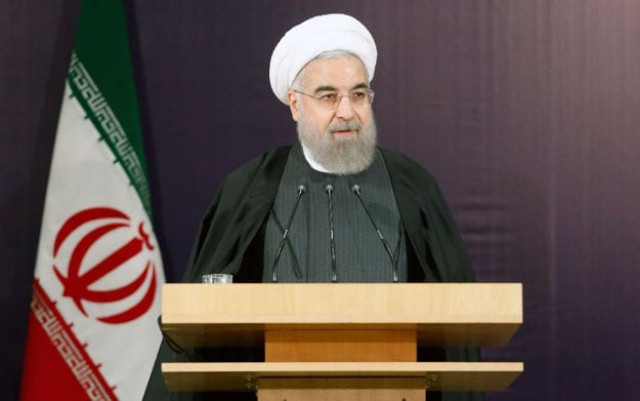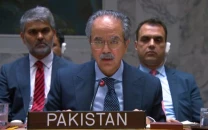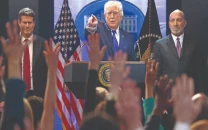Iran-US tensions flare over new sanctions threat
Relations between the two worsened since US said an Iranian vessel had test-fired rockets near three Western warships

Iran's President Hassan Rouhani has denounced possible new US sanctions on his country, which, if enacted, could jeopardise a hard-won nuclear deal PHOTO: AFP
In a letter to his defence minister, Rouhani said reports the US Treasury planned to blacklist companies and individuals with ties to Iran's ballistic missile programme constituted "hostile and illegal interventions" that justified a response.
Russia expects Iran nuclear deal to be implemented in January
Relations between the two countries have worsened since US officials said an Iranian vessel had test-fired several rockets near three Western warships, including the USS Harry S Truman aircraft carrier, in the strategic Strait of Hormuz.
Iran's powerful Revolutionary Guards, who are responsible for protecting Iranian interests in the Strait and regularly patrol and conduct exercises in the area where much of the world's oil passes, denied its ships were involved.
Spokesperson General Ramezan Sharif accused the US of fabricating the alleged December 26 incident as part of a "psychological operation".
"The Guards' naval force had no exercise in the past week when the Americans claim that a missile or rocket was fired in the Hormuz Strait area," he said.
Though the rockets were not fired toward any warship, their proximity to them and several commercial vessels -- reportedly around 1,500 yards (metres) -- was "highly provocative", said a US official.
A French frigate and the USS Bulkeley destroyer were also in the area at the time.
The Wall Street Journal reported Wednesday that the US was preparing fresh sanctions against companies and individuals in Iran, Hong Kong and the United Arab Emirates over alleged links to Tehran's ballistic missile programme.
Such a step by the US Treasury Department could present a major barrier to the nuclear deal's implementation, let alone its durability.
But on Thursday, the WSJ said the sanctions had been delayed indefinitely -- although they remain on the table -- over fears it could derail the hard-won nuclear deal.
Rouhani, whose government negotiated the nuclear deal with the US and five other world powers, warned of reprisals.
US conducting 'serious review' of alleged Iran missile test
Should individuals and companies be added to "the previously unjustified sanctions list, it is necessary that the production of various missiles required by the armed forces move forward with increased speed and seriousness", Rouhani wrote to Defence Minister Hossein Dehghan.
"If such wrong and interventionist actions are repeated by the US the ministry of defence should use all its capabilities to come up with new plans to expand Iran's missile capabilities," he added.
In the five months since the nuclear deal was struck, US officials say Iran has conducted two ballistic missile tests, one of which state media reported at the time, on October 11.
Iran also recently aired television footage of an underground missile base.
A United Nations panel found earlier this month that the missile tests breached previous UN resolutions aimed at stopping Iran from developing missiles capable of carrying a nuclear warhead.
Tehran has always denied seeking an atomic weapon and thus its missiles would not be designed to, nor ever carry, a bomb.
The nuclear deal was heralded by moderates such as Rouhani, who staked his reputation on the negotiations, but hardliners in Tehran said it damaged Iran's national interests.
Republican lawmakers in the US Congress poured scorn on the agreement and tried to stop it. Several Republicans candidates for the presidency have pledged to rip it up if they are elected next November.
Although Iran's ultimate authority, supreme leader Ayatollah Ali Khamenei, explicitly endorsed the nuclear accord in October, he warned that new sanctions, under any pretext, would constitute a violation.
The deal is due to come into effect on "Implementation Day", expected in January, or soon after, when UN monitors sign off that Iran has fulfilled its obligations and applied major curbs to its nuclear programme.
Rouhani further criticised the apparent US Treasury plans, stating that Iran's domestic defence had never been within the remit of the nuclear talks and its missiles would never be used to carry an atomic bomb.
"Iran's missile programme is in no way part of the JCPOA," he said, giving the deal its official name, the Joint Comprehensive Plan of Action. "Officials of the United States have also admitted this."



















COMMENTS
Comments are moderated and generally will be posted if they are on-topic and not abusive.
For more information, please see our Comments FAQ